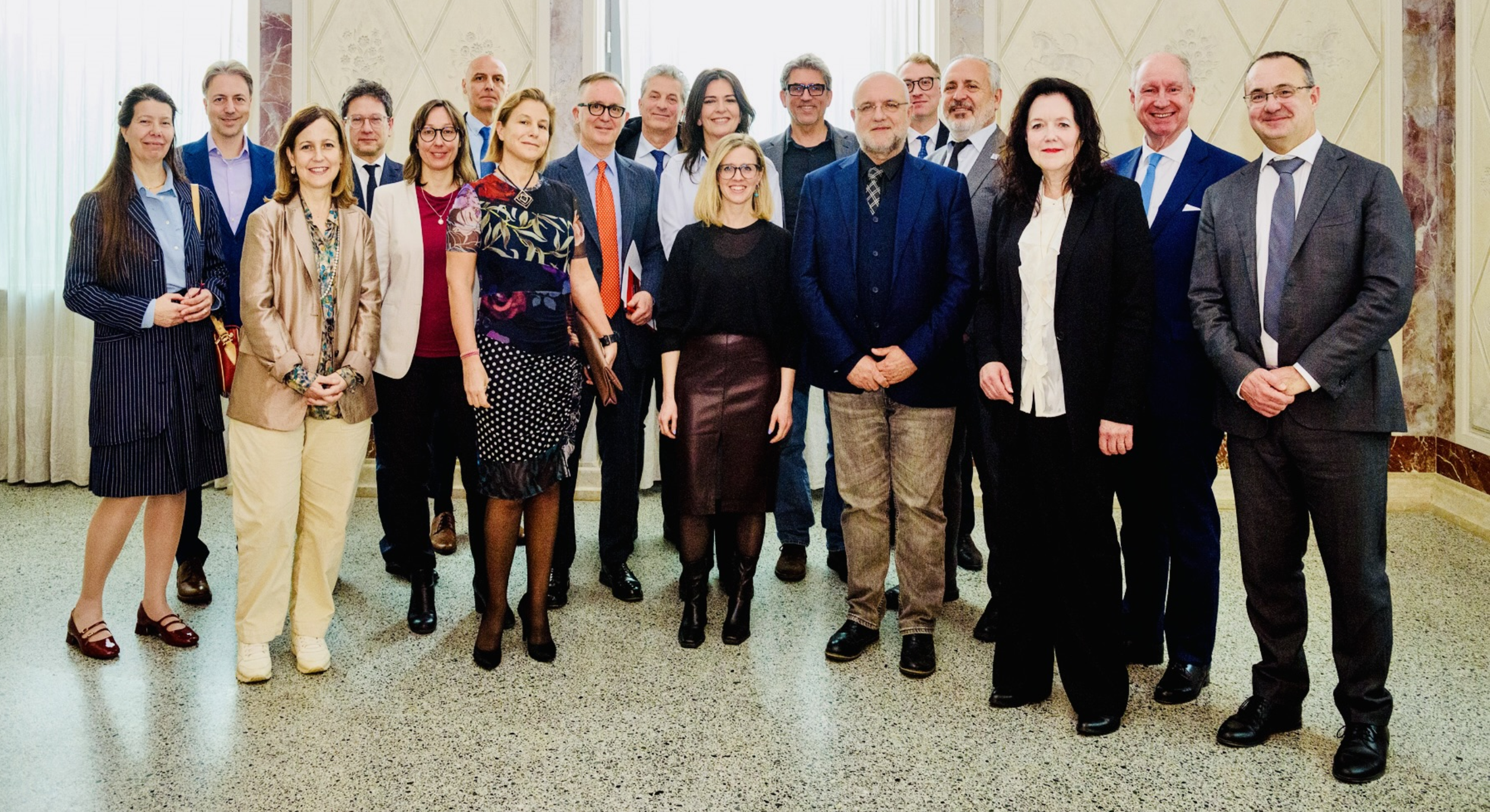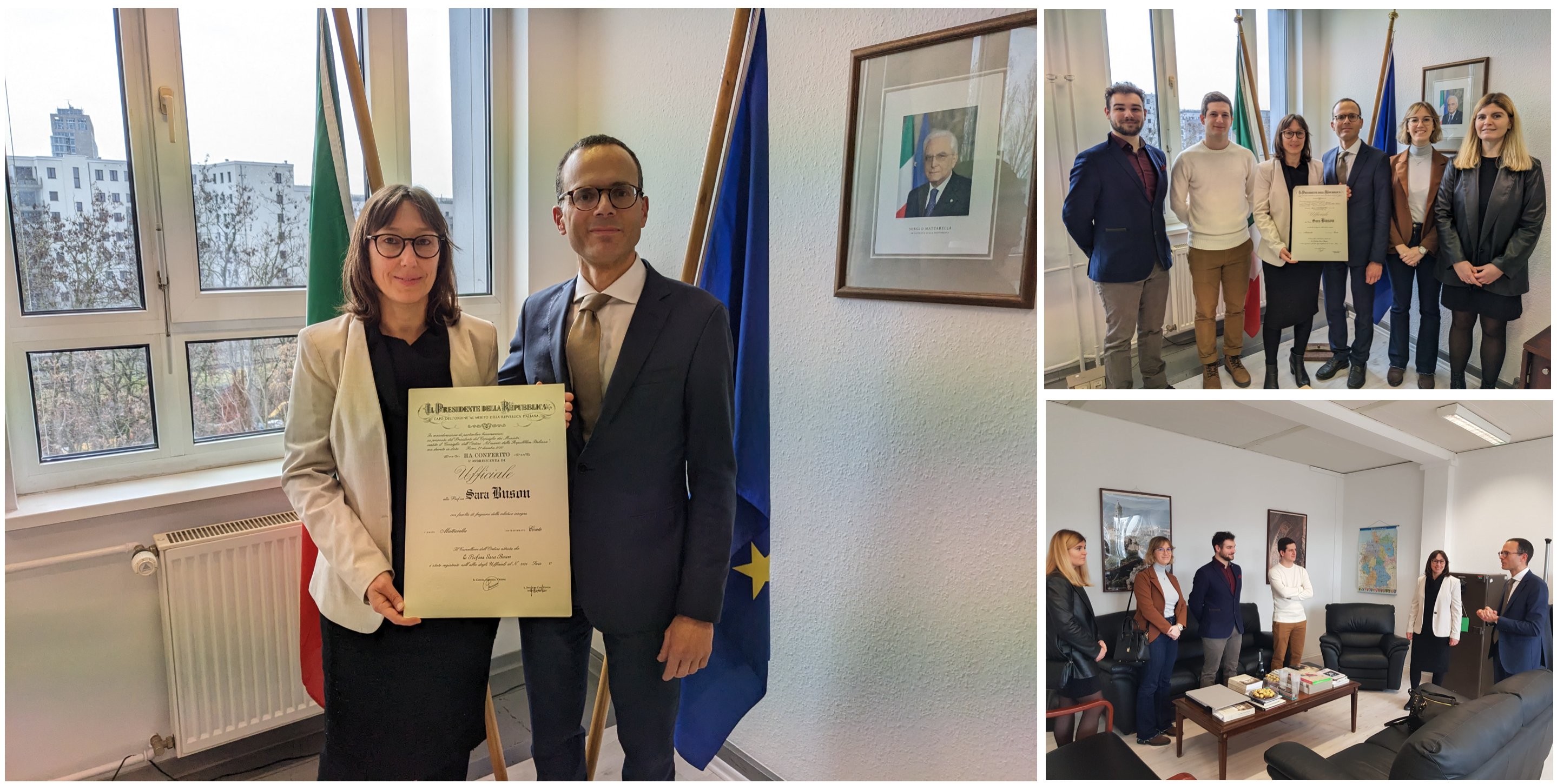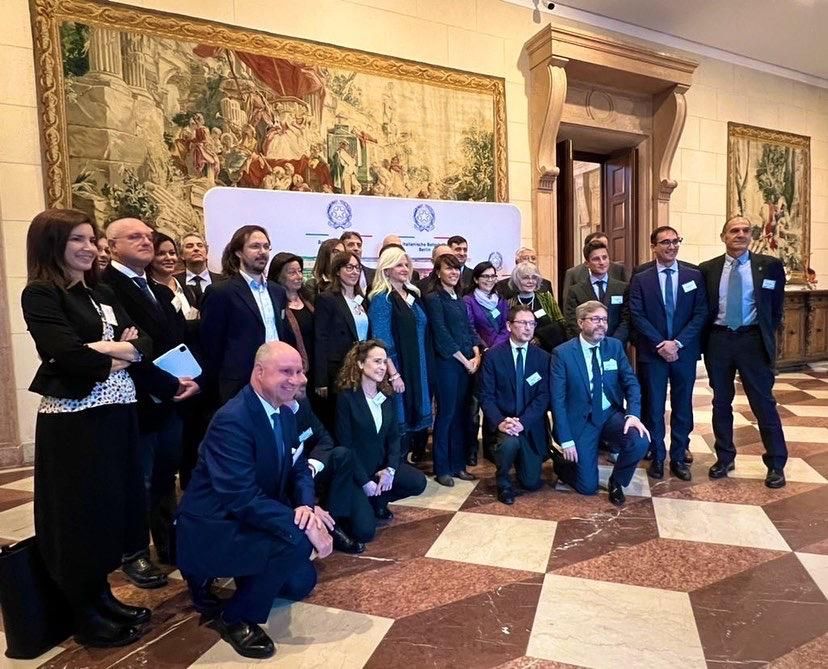April 2025 -- SIGN meets the new Italian Ambassador Fabrizio Bucci

- Strengthening Ties and Collaborative Research between Italy and Germany. Following the official National Day of Italian Research Worldwide event on April 9th, 2025, H.E. Ambassador Fabrizio Bucci welcomed a delegation from the SIGN Network, including Prof. Buson, to a private meeting at the Italian Embassy in Berlin. News available at the SIGN website.
February 2025 -- One of a Kind
- The Highest Energy Neutrino Ever Observed: The KM3NeT collaboration measured a neutrino of record breaking energies using the ARCA detector in the mediterranian sea. Our team's contribution helped shedding light in the possible blazar origin to this ultra-high-energy neutrino. Read more in the article published in Nature and the companion paper by our team. Press release available at the JMU Wurzburg website.
January 2023 -- Officer of the Order of Merit of the Italian Republic

- Prof. Buson receives the award "Officer of the Order of Merit of the Italian Republic" for the important contribution of her research to the multimessenger field. The honorary title has been bestowed by the President of the Italian Republic Sergio Mattarella, upon the proposition by the Presidenza del Consiglio dei Ministri of Italy. The official ceremony has been held at the Italian Consulate of Frankfurt am Main on January 19, 2023. In the pictures, the General Consul Andrea Samà hands the award to Prof. Buson. Students of the MessMapp team, who attended the ceremony, had the opportunity of discussing the group's science activities with the General Consul Samà. More at the Italian Consulate press.
October 2022 -- SIGN is here!

- The Network of Italian Scientists in Germany (SIGN) was founded on October 12, 2022, following the official ceremony at the Italian Embassy in Berlin. Prof. Buson is among the founding members of this association, promoted by the Italian Ambassador Verricchio. This initiative promises to foster and enhance the collaboration between scientists in Germany and Italy, and further corroborate the scientific network across the European Union, and beyond. More info available at the Italian Embassy press release.
October 2022 -- Two new members joining the team
We welcome two new team members joining the astroparticle group of Prof. Buson:
- Eleonora Barbano, joining as PhD student. Eleonora obtained her master degree at the University of Torino, under the supervison of Prof. R. Bonino. Her thesis focused on the study of cosmic rays with the Fermi Large Area Telescope.
- Gaetan Fichet de Clairfontaine, joining as a PostDoc. Gaetan got his PhD degree at the Observatory of Paris, under the supervison of Prof. A. Zech. His PhD thesis focused on the modeling of AGN relativistic jet.
July 2022 -- First results from the ERC project MessMapp published
Beginning a journey across the Universe: the discovery of extragalactic neutrino factories
- Neutrinos are the most elusive particles in the Universe, capable of travelling nearly unimpeded across it. Despite the vast amount of data collected, a long standing and unsolved issue is still the association of high-energy neutrinos with the astrophysical sources that originate them. Amongst the candidate sources of neutrinos there are blazars, a class of extragalactic sources powered by supermassive black holes that feed highly relativistic jets, pointed towards the Earth. In this work we show that blazars are unambiguously associated with high-energy astrophysical neutrinos at unprecedented level of confidence, i.e. chance probability of 2 × 10^{−6}. Our statistical analysis provides the observational evidence that blazars are astrophysical neutrino factories and hence, extragalactic cosmic-ray accelerators.
- Read the article in ApJL (Buson et al. 2022, ApJL , 933, 43; ArXiv link).
- Correction to the article in ApJL (Buson et al. 2022, ApJL , 934, 2).
December 2021 -- One new PhD Candidate joining the team
We welcome one new team member joining the astroparticle group of Prof. Buson:
- Alessandra Azzollini, joining as PhD student. Alessandra got her master degree at the University of Pisa, under the supervison of Prof. S. Shore. Her thesis focused on the study of novae with the Swift Neil Gherels/UVOT telescope.
July 2021 -- Establishing the new Research Unit "Relativistic Jets in Active Galaxies"
The main goal for the newly established Research Unit will be advancing our understanding of powerful extragalactic jets fueled by supermassive black holes. Our group will lead the project taylored on studying high-energy properties of jets, with focus on the flaring and time-dependent modeling of blazars. In addition to activies to be developed at the University of Würzburg other projects are located at the universities of Hamburg, Heidelberg, Erlangen-Nuremberg, at the Leibniz Institute for Astrophysics in Potsdam and at the Max Planck Institutes for Astronomy and Radio Astronomy in Heidelberg and Bonn. The German Research Foundation (DFG) will fund the group of ten researcher PIs with 3.6 million euros over the next four years. Find out more in the Würzburg Universität press release .